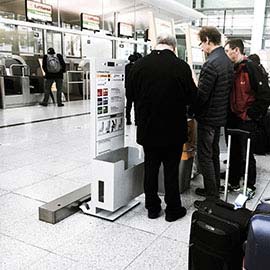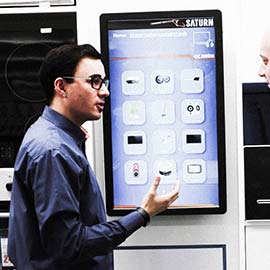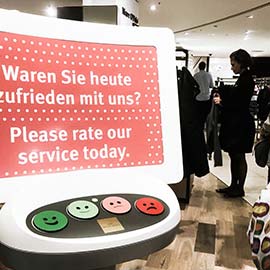The power of employees
A company is only then successful if it understands its people. Probably a seemingly trite finding, yet – how does a company arrive at that sort of understanding and what group of people is being referred to? The customers, one would respond immediately, and that’s correct, of course, however, the company’s employees are playing an enormously important role too. In fact, a reality whose dimensions most business managers aren‘t quite aware of yet. Therefore I’d like to cite a few impressive facts first: 17% of a company’s employees have already mentally resigned and 67% slog away without feeling any emotional affiliation with their company or their employer. Such survey results from Gallup market researchers are shocking us anew year after year and there doesn’t seem to be any foreseeable improvement. According to reports neither the finance nor the economic crises have in any way resulted in a greater commitment to the company by its employees simply for fear of losing their jobs. It is therefore little consolation to know that the number of truly loyal employees in the year 2013 with a percentage of 16% represents a 1% increase of the figure for the same period the previous year – well, at least! The question therefore arises where the focus should be in order to create the necessary conditions in a company to keep employees motivated, dedicated and long-term committed to their professional duties.
The reasons why employees are not part of the committed and loyal group are as diverse as the employees themselves.
However, in that case the negative effects are very quickly felt and affect first and foremost those people that bear no responsibility whatsoever for the “individual misery” of an employee – the customers! Silent boycott and a mere work-to-rules are usually the more harmless versions of protest employees deploy in order to demonstrate their displeasure at the demands and “impositions from above”. In Germany alone it is estimated that the resultant loss of productivity amounts to an unbelievable three digit billion sum annually!!! One must not only begin to understand this impact but also realize the enormous need for action by businesses to expressly deal with this passive form of power and resistance of their employees. Also the fact that this phenomenon is measured or estimated in units of „loss in productivity“ shows that even in Institutes for Economic Research “Taylorism” continues to hold a very strong presence and that a Service Dominant Logic is still a far cry and too abstract for many people.
Successful businesses have since realized that the basis for loyal and dedicated employees clearly lies in one fact one would not necessarily think of in the first place as being directly linked to the circumstance.
Strong emotional ties between customers and the product or service range on offer are essentially necessary in order to create and shape an authentic and stimulating customer experience, one which ultimately sets the enterprise apart from its competitors and results in economic success. And who plays the decisive role in this? Exactly, neither the product nor the service offered but the employees of the company who will add their personal touch and in consequence give it that all important personal attribute – the decisive human dimension – which will ultimately influence the purchase decision and the successful recommendation of a company’s products and services. If employees are not prepared, however, to make this essential contribution or if they are perhaps unaware of their importance in this regard one has actually lost already. Customer relations on a neutral transactional level – at best! – will never lead to a positive emotional bond with a business and arbitrary alternatives such as shifting towards competitors are pre-programmed as a result.
The fact is that there are way too many businesses out there with very similar products, similar pricing structures and of similar quality who employ staff with similar qualifications who are responsible for similar scopes of duties and who carry out similar tasks and duties. Not only that, but this simple fact is also combined with the massive pressure from a steadily growing array of products and services available on an increasingly attractive competitor – “the internet”. Many of these online businesses are genuinely “pure players” and therefore enjoy the added advantage of not having to deal with the everyday challenges of having to face their off-line competitors who have often grown over several decades, nor are they liable for any additional costs associated therewith. However, traditional companies have the incomparable advantage of offering their customers a real experience by getting „in touch“ with real employees who will make every possible effort – humanely and personally – to listen to their customers and to pay attention to them and their specific requests and therefore create positive interpersonal experiences which form the basis of strong emotional ties and business loyalty, obviously on condition that the employees of a business are aware of their important role and prepared and ready to „go the required extra mile“!
Businesses are not only dependant on innovative ideas but also rely on the crucial factor of employee loyalty and commitment, indeed more than ever. This powerful position of employees impacts on entire sectors of the economy, quite strongly at least those that rely on strong personal customer relations. Employees who are in daily contact with customers are direct communicators and therefore contribute considerably to corporate branding and the shaping of the all-important and decisive customer experience and must therefore be recognized, in a non-reversible transformation, that they have evolved from a mere production factor to an invaluable company asset in terms of human resources. The personal service offered by professionally knowledgeable and competent employees who are empathic towards the customer is and remains one of the most important and crucial factors in any business that clearly sets it apart from its competitors. The question begs to be asked whether businesses are always aware of this fact.
At the same time there is a trend that does not at all seem to fit this fundamental finding – the steadily progressing rationalization of simple service offers.
On one hand this is done with the help of technology, for instance the use of self-service cash systems or cash point terminals. Duties that have previously and traditionally been carried out by employees are gradually being transferred and delegated to machines and the customers which enable these processes to be standardized. Or the scope of employee duties is being reduced and substantially trimmed or simplified. In large cash discount supermarkets or international brand chains like H&M or Zara customer advisory service no longer forms part of the job profile. It is sufficient if the shelves are well stocked and the shop floors are clean. The employees no longer need detailed product knowledge, in fact no specific qualifications anymore. All remaining simple duties become universal – this way any employee can therefore be employed anywhere within the business: unpacking goods, collecting merchandise from the warehouse, sorting and stocking shelves, cleaning work areas. Standardization, universalization and ultimately the consolidation of work chores seem to be the most effective instruments in the ongoing rationalization process of simple service delivery. The principal objective is the creation of a status quo the customer is accustomed to. The office is clean, the hotel bed is made, the sales area is always well stocked with goods, the mail is in the postbox. The direct interaction between the service provider and the client disappears. Usually, you will not get to see the person who cleans your hotel room, and if you do he or she won’t have the time to chat with you. And even if we collect the parcel from the post office clerk, we will only recognize a fraction of his workload. This contradicts the old adage that service provision first and foremost comprises of interaction with the customer, who, if he is satisfied, will express his appreciation. This is something that will fall by the wayside now, if cleaning crews are moving through the office storeys at 4:00 a.m.
This is one of the principal reasons why simple service jobs lack the professional pride and ambition and many employees describe their job as one that’s pretty much “worthless” and unappreciated. It goes without saying therefore that the affected employees do not necessarily bond and identify with their company, nor do they feel overly obliged to show commitment and dedication. The result of their efforts is often unsatisfactory for all and the interchangeability without any consideration for the individual circumstances reflects in the continuous necessity for businesses to recruit, train and equip personnel in time- and cost-intensive procedures. A fatal development that makes this kind of „simple service deliveries “ increasingly interchangeable and impersonal for the customer on the one hand, and on the other poses a growingly daunting challenge for the enterprise. Who is going to offer such “worthless” service deliveries in future? What incentives will be required in order to motivate and interest potential employees? It is therefore questionable whether businesses who decide to take this direction will be able to remain successful in the long run. One thing is clear that nobody wants to be an employee of such a business.
Whereas successful enterprises have realized that and how they can steer the „power of their employees“ thus exploiting this know-how to maximum benefit for all.
A business must keep its internal commitment, and follow through on promises made to potential future employees during the personnel recruitment process – in form of general work conditions, processes and corporate culture. Likewise, the business or brand must keep its promise to the market and provide to the customers that which it advertises – each and every day and at each and every single contact point. Keeping the brand promise lies squarely in the hands of the company’s employees. That way the circle closes and the foundation is laid to the enormous “power and influence of the employees”.
How can a business enable its employees to provide and to actually desire to carry out exceptional service delivery to the customer? How can a business communicate the importance of their crucial role in the business and how can the enterprise support their employees in their daily efforts to provide the perfect customer experience?
First of all this requires more effort, attention and respect – everything that humans would pay particular attention to in their mutual rapport, particularly if they expect a little more from one another , rather than the mere exchange of goods or services for money. In addition and aside from creating the corporate framework, it is absolutely necessary too, to communicate the objectives to the staff in clear, practical and realistic terms: what needs to be done, how it should be done and what the company desires to achieve with regards to their customers! It is therefore necessary to explain to the employees who they will be dealing with in their day to day customer contact. So-called personas are used to clearly demonstrate and show the different types of customers and their specific needs and expectations. Employees need to understand – at least on an aggregated level – how the entire customer journey comes about – that is at which contact point in the business the customer experiences a service delivery before, during and after the purchase of a product and what therefore needs to happen at this point, or rather what must not happen at all.
Only this way it is possible to intelligibly communicate the fundamental knowledge of the essential inter-relation between brand promise and customer expectation, and therefore create conditions which need to be implemented by the company’s employees in their daily effort to provide the best possible if not extraordinary service delivery on the shop floor. We know from experience of successful businesses that it is vital to take into account HOW this knowledge is communicated to staff. It is not enough to just tell them, hand them manuals or delegate this important task to electronic self-study platforms, as none of the aforementioned will ever achieve the desired and all-decisive effect. It most definitely calls for tangible, concrete and easily understandable means to communicate the know-how to the employees, and it is of utmost importance to stress the emotional aspect of the customer experience and make employees directly and equally experience what enormous importance each customer experience means to the company, and which incredible responsibility each employee carries and must therefore fulfil.
In reality it is the customer who is the employer, because it is the customer alone who brings in the money and the business.The better each employee understands and grasps this reality and the better each employee comprehends the fundamental advantage to himself, the better and the more willingly he will focus his effort towards meeting and satisfying the customer expectation in the interest of the business.
Loyal customers cannot be won over through mere advertising, they have to be „earned“! This is undoubtedly tedious, painstaking and laborious, however, it is certainly the most convincing and sustainable direction a business can take in order to win and become successful in the long run.
„If we decide to love the job we do we will be able to experience happiness, a purpose of life and fulfilment.“ If you create the necessary conditions to enable your employees to live by this in their day to day job, it goes without saying that you will have content, loyal and dedicated employees in natural consequence. Employees who will happily use their „power“ for the good and the benefit of all – noticeable for colleagues, superiors and customers alike.



























